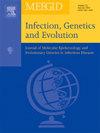Recent advances in the interaction between acute respiratory distress syndrome and gut microbiota: A narrative review
IF 2.6
4区 医学
Q3 INFECTIOUS DISEASES
引用次数: 0
Abstract
Acute respiratory distress syndrome (ARDS) is a sudden, widespread inflammatory damage to the lungs resulting from multiple etiologies. ARDS is characterized by high sickness rates, mortality, and costly treatments and is a significant global health issue that lacks an effective treatment strategy. The microbiota of the gut is an intricate ecology indispensable for the host's health, immunology, and metabolism. Human immunity and intestinal barrier function depend on gut microbes. Several disorders are linked to gut microbiota dysbiosis. Scientists have been concentrating on the role that gut microbes play in the onset of ARDS. This study examines the relationship between ARDS and intestinal microbiota, specifically addressing two facets: how ARDS affects the composition of the gut microbiota and the integrity of the intestinal barrier, alongside the effects of mechanisms such as bacterial translocation and inflammatory activation resulting from gut microbiota dysregulation on ARDS. Additionally, various therapeutic strategies involving gut microbiota and its metabolites, such as selective digestive decontamination (SDD), fecal microbiota transplantation (FMT), microbiological preparations, and metabolites produced from the microbiota, are explored. It is anticipated that this exploration will make a substantial contribution to the prevention and therapy of ARDS.
急性呼吸窘迫综合征与肠道菌群相互作用的最新进展:综述。
急性呼吸窘迫综合征(ARDS)是一种由多种病因引起的肺部突然、广泛的炎症性损伤。ARDS的特点是高发病率、高死亡率和昂贵的治疗,是一个缺乏有效治疗策略的重大全球卫生问题。肠道微生物群是一个复杂的生态系统,对宿主的健康、免疫和新陈代谢不可或缺。人体免疫和肠道屏障功能依赖于肠道微生物。一些疾病与肠道菌群失调有关。科学家们一直在关注肠道微生物在ARDS发病中的作用。本研究探讨了ARDS与肠道微生物群之间的关系,特别是解决了两个方面:ARDS如何影响肠道微生物群的组成和肠道屏障的完整性,以及肠道微生物群失调引起的细菌易位和炎症激活等机制对ARDS的影响。此外,还探讨了涉及肠道微生物群及其代谢物的各种治疗策略,如选择性消化净化(SDD)、粪便微生物群移植(FMT)、微生物制剂和微生物群产生的代谢物。预计这一探索将对ARDS的预防和治疗做出重大贡献。
本文章由计算机程序翻译,如有差异,请以英文原文为准。
求助全文
约1分钟内获得全文
求助全文
来源期刊

Infection Genetics and Evolution
医学-传染病学
CiteScore
8.40
自引率
0.00%
发文量
215
审稿时长
82 days
期刊介绍:
(aka Journal of Molecular Epidemiology and Evolutionary Genetics of Infectious Diseases -- MEEGID)
Infectious diseases constitute one of the main challenges to medical science in the coming century. The impressive development of molecular megatechnologies and of bioinformatics have greatly increased our knowledge of the evolution, transmission and pathogenicity of infectious diseases. Research has shown that host susceptibility to many infectious diseases has a genetic basis. Furthermore, much is now known on the molecular epidemiology, evolution and virulence of pathogenic agents, as well as their resistance to drugs, vaccines, and antibiotics. Equally, research on the genetics of disease vectors has greatly improved our understanding of their systematics, has increased our capacity to identify target populations for control or intervention, and has provided detailed information on the mechanisms of insecticide resistance.
However, the genetics and evolutionary biology of hosts, pathogens and vectors have tended to develop as three separate fields of research. This artificial compartmentalisation is of concern due to our growing appreciation of the strong co-evolutionary interactions among hosts, pathogens and vectors.
Infection, Genetics and Evolution and its companion congress [MEEGID](http://www.meegidconference.com/) (for Molecular Epidemiology and Evolutionary Genetics of Infectious Diseases) are the main forum acting for the cross-fertilization between evolutionary science and biomedical research on infectious diseases.
Infection, Genetics and Evolution is the only journal that welcomes articles dealing with the genetics and evolutionary biology of hosts, pathogens and vectors, and coevolution processes among them in relation to infection and disease manifestation. All infectious models enter the scope of the journal, including pathogens of humans, animals and plants, either parasites, fungi, bacteria, viruses or prions. The journal welcomes articles dealing with genetics, population genetics, genomics, postgenomics, gene expression, evolutionary biology, population dynamics, mathematical modeling and bioinformatics. We also provide many author benefits, such as free PDFs, a liberal copyright policy, special discounts on Elsevier publications and much more. Please click here for more information on our author services .
 求助内容:
求助内容: 应助结果提醒方式:
应助结果提醒方式:


